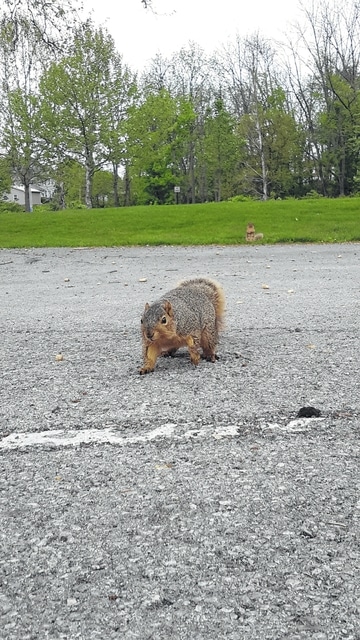
WASHINGTON C.H. – The red squirrels residing in Washington Park located on Eyman Park Drive are being fed peanuts. Peanut shells nearby lethargic, fearless red squirrels were found in the parking lot of Washington Park Thursday.
Red squirrels, like those at Washington Park, are common throughout Ohio, as are brown squirrels, but the most common squirrel in the state of Ohio is the flying squirrel, according to the Ohio Department of Natural Resources (ODNR) Division of Wildlife’s website. No matter the type of wildlife, humans should be careful not to feed wildlife, according to ODNR.
“In general, we discourage the feeding of wild animals. Usually it’s the wildlife that loses,” said Brett Beatty, wildlife management supervisor in Xenia. Beatty supervises the ODNR Division of Wildlife in District Five.
“A lot of time the wildlife isn’t getting the right nutrition,” said Beatty. Human food is unhealthy for wild animals, according to the ODNR Division of Wildlife.
While the occasional roasted nut may be healthy for a squirrel, peanuts contain an invisible toxic mold that is poisonous to squirrels, according to squirrelnutrition.com, a site that offers free advice to all aspects of squirrel care.
According to the information provided by the website, peanuts do not give a squirrel enough calcium and can “lead to sudden cardiac death” or “a horrible death from a major fracture to their pelvis or spine.”
Beatty said it’s “best to enjoy wildlife from afar” and that animals may lose fear of people and become aggressive.
“People have good intentions when they feed wildlife but usually it’s the exact opposite. The results are bad,” said Beatty, because feeding wildlife means an animal that “gets aggressive, has to be removed.”
Beatty said he had not heard of squirrels being fed in the park before and said he is not aware of any cases in which squirrels had to be removed.
“It depends on the situation,” said Beatty. “It may not lead to their removal.”
In cases where animals have become aggressive and lost their fear of people and must be removed, Beatty said “we always hear about the children—children not being able to go to the park because of the wildlife.”
And Beatty pointed out that families are less likely to enjoy the park if the animal’s excess excrement from being fed by humans gets in the way. Squirrels are one species of animals in which the parent squirrels carry the excrement of the baby squirrels out of the nest site, according to a April 14, 2012 column in the Washington Post. But if squirrels aren’t removing their excess excrement from the park, they could be leaving behind more than just feces—it could be diseases that cause respiratory and flu-like illness.
Squirrel excrement can have “…leptospirosis in the feces … can be fairly mild in many cases, causing flu-like symptoms, in other situations it can lead to serious respiratory problems or even death. Salmonella is another condition that you can catch easily from squirrel feces,” according to Wildlife Removal USA, a national organization of wildlife removal professionals.
“Anytime you increase the wildlife and human interaction, the chances for a negative interaction increases,” said Beatty.


